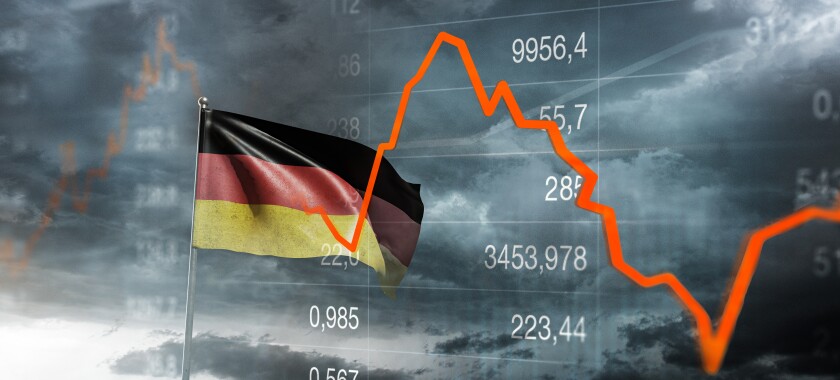Market overview
The German M&A market showed remarkable resilience in 2023, maintaining a steady pace of activity despite geopolitical uncertainties, economic headwinds, and growing regulatory scrutiny.
Naturally, these developments led to a more cautious approach from financial investors and a reduced number of private equity deals, including leveraged buyouts, IPOs, and public takeovers. But strategic investors – generally less dependent on external financing and, hence, less affected by increased interest rates – took the opportunity of fewer deal competitors and stayed active in the M&A market of 2023.
While mega-deals were rare, a shift towards divestitures, joint ventures, and strategic partnerships, as well as transatlantic deal activity, has become evident. Combined with numerous transactions in certain sectors, such as technology and energy, and a strong small and midcap market in which financing matters less, the overall M&A situation in Germany in 2023 was robust.
Looking ahead, as interest rates continue to stabilise, a more favourable environment is anticipated for financial investors to access debt capital and, thus, a boost to deal activity. This may be particularly beneficial for capital-intensive industries. Given the ongoing recovery of the capital markets and the broader economy, an uptick is expected in the number of IPOs in 2024, reflecting renewed confidence and a general revitalisation compared to 2023.
Public and private M&A are both key for the transactions market in Germany. Starting during the COVID-19 pandemic, a number of IPOs and public deals received noticeable attention; however, private deals still lead the league tables. While 2023 remained influenced by volatile capital markets and a few pulled IPOs, 2024 has already started strong with the Renk and Douglas IPOs, as well as the announced €3 billion MorphoSys and €2.9 billion ENCAVIS takeovers. More IPOs (in particular, as part of dual-track exits) and public takeovers are in the immediate pipeline.
Despite the rather bleak state of the German economy, a number of high-profile transactions in the past year indicate a recovery of the German M&A market. This included infrastructure deals, which reached strong levels in 2023, a trend that is set to continue in 2024.
With the continued growth of AI and digital operations, investors are showing increasing interest in infrastructure assets such as data centres and fibre-optic networks. These emerging asset classes offer fresh opportunities for investors and debt providers, especially in Europe and Asia. Germany, with its central location and well-developed telecommunications infrastructure, is particularly attractive for such investments. A recent example is NorthC, a leading European provider of regional data centres, which recently entered into the Frankfurt data centre market. After fulfilling the necessary regulatory and planning requirement, including the acquisition of a suitable plot of land, the company will now develop a 5 MW data centre in Frankfurt.
The rising interest in the purchase of large infrastructure projects was further underlined by RWE forming a joint venture with Masdar to develop two giant offshore wind parks off the coast of the UK.
SAP’s acquisition of LeanIX demonstrates how strategic buyers may also bolster their suite of business transformation tools and represented one of the larger German transactions in 2023.
In addition, investors are increasingly acting as leading providers of capital solutions to large global corporations in a variety of industry sectors. Apollo, for example, invested about €1 billion in a portfolio of high-quality real estate assets controlled by Vonovia in Southwest Germany in the first quarter of 2023. Six months later, Apollo broadened its partnership with Vonovia by another €1 billion long-term investment in real estate assets in Northern Germany controlled by Vonovia.
Economic recovery
Following the outbreak of the COVID-19 pandemic there was a rapid incline in dealmaking, marked by very low interest rates and large amounts of money available for investments. This came to an abrupt stop with the Russian invasion of Ukraine and the ensuing global economic turmoil in 2022, accompanied by high inflation levels and a corresponding rise in interest rates. High interest levels and continued value misalignment between buyers and sellers remained key features of the M&A market in 2023, with subdued deal activity from financial sponsors. In line with the global trend, deal values trended downwards, although the number of transactions did not decline significantly. In fact, M&A activity in Germany remained stable and was stronger than in any other continental European jurisdiction.
Based on the current pipeline, a robust development of the German M&A market is expected in 2024, with respect to private equity and corporate deals. With the 2023 volume of sponsor-led transactions in Europe being at the lowest level in a decade, a large backlog has built up, with many investors sitting on record levels of dry powder that need to be deployed, while invested funds need to return equity to their investors sooner rather than later. Strategic investors that may have been busy with increasing raw material prices and supply chain issues, may now look at opportunities to sell or acquire businesses while they still have a competitive advantage over private equity investors. At the same time, buyers and sellers are beginning to narrow the valuation gap, signalling a move towards a more balanced understanding of key deal parameters. However, existing investment models and acquisition playbooks may need to be revisited as the era of extremely cheap money and ever-increasing valuations seems over. Players with creative investment strategies will see ample opportunities in the upcoming months. The collapse of corporate groups and real estate conglomerates will offer attractive investments for buyers that do not shy away from distressed situations.
Compared with previous years, international investors are still less enthusiastic about assets in Europe, where energy costs are high and growth is expected to remain low in 2024. However, European companies are showing resilience and adaptability. They are actively seeking and capitalising on growth opportunities in select markets, such as the US, showing their commitment to expansion and diversification.
In 2023, deal structures were affected by recently introduced regulatory hurdles and constrained access to debt financing at attractive costs. Financial investors that heavily depend on debt financing, in particular, encountered difficulties. Further reference is made to regulatory hurdles in the “Legislation and policy changes” section below.
Banks and debt funds were more selective with regard to providing debt financing and scrutinised targets to a greater level than in previous years. Generally, except in rare cases in which assets had extremely positive outlooks, debt at attractive costs was difficult to obtain. Consequently, some private equity and venture capital firms have paused their investment activities altogether. On the other hand, strategic bidders with available but untapped capital have been able to utilise their resources more flexibly, resulting in increased activity within the market.
The challenging financing markets, resulting in lower valuations and fewer exit routes, had an impact on the options for assets held by financial sponsors and real estate investment funds. Thus, more deals of the following types can be expected:
Asset disposals by issuers/borrowers with insufficient liquidity to wait for lower rates in order to manage their repayment schedule;
Debt-to-equity swaps and pre-insolvency restructurings;
Carve-outs and business divestitures from corporates, also driven by shareholder activists voicing their expectations on value creation;
Distressed sales – in particular, in the real estate development market – creating value buy opportunities;
Secondaries fundraising, with a small but growing portion of “direct secondaries” (transfer of portfolio, rather than limited partner interests);
More sponsors to focus on existing assets utilising fund-to-fund transfers to retain prized portfolio investments; and
Support of an acquirer’s acquisition financing (e.g., through secured asset-level financing without triggering customary change of control provisions), with these types of arrangements providing more flexibility to partners that wish to guarantee partnership debt and enter into joint venture transactions.
Legislation and policy changes
Private M&A transactions are primarily structured as share or asset deals and not subject to any particular statutory processes (other than regulatory clearances, certain registrations, and/or reissuance of permits).
In contrast, public M&A transactions have to comply with:
The German Securities Acquisition and Takeover Act;
The EU Market Abuse Regulation (Marktmissbrauchsverordnung); and
The German Stock Corporation Act.
They are subject to the supervision of the German Federal Financial Supervisory Authority (BaFin).
Private and public M&A transactions may be subject to German merger control. Furthermore, the Federal Ministry of Economic Affairs and Climate Action (BMWK) has the power to review direct or indirect acquisitions of German-based companies by foreign investors. The BMWK may prohibit any acquisition of 25% or more of the voting rights by a non-EU/European Free Trade Area investor or request commitments if the acquisition is likely to affect public order or security. In addition, acquisitions of 10% or more of the voting rights in a company active in certain sensitive areas, such as critical infrastructure (e.g., IT-related real estate or telecommunications infrastructure) or in military and defence must be notified to, and cleared by, the BMWK before the acquisition can be closed. Recently, several new sectors under foreign direct investment (FDI) scrutiny were added so that the scope of mandatory filings increased notably. In addition, the BMWK can review acquisitions if the foreign investor acquires other means of influence; more specifically, board seats, veto rights, and/or certain information rights. The acquisition of such “atypical control” is not subject to a mandatory filing requirement but still carries the risk of an ex officio review by the German government, so a voluntary filing should be considered.
Changes in corporate and related laws – such as those introduced by the Draft Future Financing Act, the Supply Chain Law, changes to the Foreign Trade Ordinance and Act, and the Foreign Subsidies Regulation (FSR) – are impacting M&A structures and timelines. These changes may include:
Provisions for multiple-vote shares (dual-class shares);
Simplification of capital increases;
More flexibility on employee stock options; and
Expanded FDI screening.
The FSR grants the European Commission the authority to examine and address distortive subsidies, including M&A deals (subject to certain concentration benchmarks) that involve any firm benefiting from subsidies provided by non-EU nations.
The Modernisation of the Civil Law Partnership Act came into effect on January 1 2024, introducing revisions to various aspects, including the fundamental framework of investment entities, requiring, foremost, changes to the articles of association of the investment entities.
The German government is in the process of significantly revising its FDI framework, which might even include introducing a new investment screening act. This could expand the reach of Germany’s FDI regulations, encompassing a wider array of mandatory submission requirements. This expansion may affect areas such as critical infrastructure, essential technologies, agreements related to intellectual property licensing, and some new investments in high-technology fields.
Practice insight/market norms
Foreign investors continue to wonder about the notarisation requirements in Germany particularly in connection with German limited liability companies. Share purchase agreements, including all annexes, must be read out by a notary to the parties. However, the notarisation process is generally no obstacle to any deal but serves as a disciplinary tool to complete negotiations and ensure the documentation is in final shape. Costs can be considerable and need to be factored into the buyer's transaction budget.
Depending on the deal structure, seeking employment and tax advice early on is highly advisable in Germany (as in most jurisdictions).
Technology improvements are still facilitating M&A processes; e.g., through expedited and effective document and data handling. This trend will continue with the rise of powerful, yet secure, AI tools.
Public M&A
The scope of legal documentation required for the acquisition of shares in a public company depends on the type of business combination chosen, as well as on the type of shares being acquired and whether these shares are to be acquired over the stock exchange, via a capital increase, or from other shareholders.
Holding 30% of the voting rights in a listed company amounts to “control” under German takeover law. Whoever is about to reach or exceed this threshold, directly or indirectly, will need to consider a public takeover offer. Such an offer requires an offer document. Unsolicited takeover attempts are rare in Germany; in particular, since cooperation with the management is key for a successful integration of the acquired company into the bidder structure.
After the decision to launch an offer has been published, the management board is prohibited from taking any action that could prevent the success of the takeover offer (no poison pills). But the management board may:
Search for a “white knight”;
Take any action within the scope of the management board’s powers if approved by the supervisory board and if no further legal requirements exist; and
Take actions that would have reasonably been taken if no offer had been launched, even if this limits the success probability of the offer.
Furthermore, the shareholders may, under certain restrictions, authorise the management board to take action within the scope of the powers of the shareholders’ meeting before, and independent of, any takeover offer.
BaFin takes a rather restrictive position on the possibility of imposing offer conditions.
Voluntary public takeover offers (offers by buyers that do not already own shares in the target company or whose shareholding is below 30%) are usually only subject to regulatory approvals, fairly standardised market and company material adverse change clauses, and no defensive measures (such as capital increases during the offer period) being taken. There is often a minimum acceptance threshold for offers, as the acquisition of only some of the shares may not be attractive.
Mandatory offers, which are triggered once a shareholder reaches 30%, can only be made subject to regulatory conditions. Minimum acceptance thresholds are not available.
In public M&A transactions in Germany, parties can employ several deal protection measures to safeguard the interests of the acquirer and ensure the successful completion of the transaction. These include the prohibition to search for alternative bidders (white knight), implement structural measures (capital increases, mergers, etc.), or buy back its own shares. These measures are subject to legal and regulatory constraints, particularly under the German Securities Trading Act, the German Stock Corporation Act, and the Takeover Act.
Notably, deal protection measures in Germany must be carefully structured to comply with legal requirements and to respect the principle of equal treatment of all shareholders as stipulated by the Takeover Act. Additionally, the management and supervisory boards of the target company have fiduciary duties to act in the best interests of the company and its shareholders, which may limit the extent to which certain deal protection measures can be implemented.
Private M&A
The 10th edition of the Latham & Watkins Private M&A Market Study shows that locked-box mechanisms for purchase price provisions remain popular in Europe, while in the US, the vast majority of private deals feature completion accounts with post-closing purchase price adjustments. Earn-outs are increasingly used in European deals – in particular, to bridge valuation gaps – but they remain uncommon overall. The use of earn-outs varies between sectors and seem to feature most prominently in technology deals.
Escrows remain uncommon across all jurisdictions. Only 15% of deals in 2022–23 featured an escrow, a slight decrease compared with earlier editions of the study. This decrease is in part due to warranty and indemnity insurance, and sellers providing relatively limited covenants in the 2021–22 seller’s market. The decrease also suggests that, despite buyers’ concerns about sellers’ ability to meet post-closing obligations, sellers are successfully resisting requests for a portion of the purchase price to be placed in escrow.
Share purchase agreements relating to German targets are usually governed by German law under the jurisdiction of German courts or arbitral tribunals.
A relatively weak economy and rising financing costs, with increasing pricing expectation gaps, led to cautious investor behaviour in 2023, resulting in a decline of exit valuations. This, combined with a significant degree of volatility in the capital markets, saw trade sales emerge as the preferred exit strategy.
In 2023, IPO proceeds were at the second-lowest level in the past decade. A significant backlog of unsold (exit-ready) assets has accumulated in private equity portfolios. Looking ahead, there are promising signs of a resurgence in the IPO and private equity exit markets in 2024. As the financial landscape stabilises and valuation expectations between buyers and sellers align, the exit environment will likely improve, offering a more favourable climate for private equity managers and companies looking to go public. The first few months of the year have shown positive signs for a moving market, reinforcing confidence in the resilience and adaptability of the financial markets.
Looking ahead
The global political landscape remains complex. The conflicts in Ukraine and the Middle East, and several significant elections in 2024 can impact M&A activity, making it difficult to predict what 2024 will look like overall. While these circumstances may introduce a degree of uncertainty, they also provide a platform for strategic foresight and opportunity.
Deal activity is already kicking off in 2024, which has seen a busier start than 2023. Deal activity is expected to accelerate further during the rest of the year, as financial investors continue to hold record levels of cash and corporations still need to transform. The stabilisation of inflation and interest rates will further increase deal activity.
Although the German M&A market may not revert to the distinct seller’s market of previous years, market players will proceed more cautiously and, in particular, take in the increased burdens of regulatory necessities. Deal-making processes are expected to continue to be longer, as risks and benefits will be considered more carefully, leading to enhanced due diligence processes and deal structures. Transaction documents and deal terms will have to be considered in more detail and adjusted in light of the increased risks.



